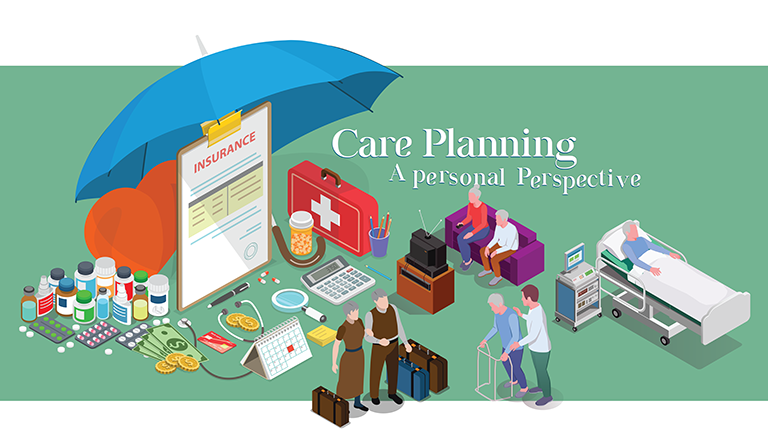As we mature and experience life, with its hurdles and rewards, we rarely contemplate long-term care (LTC) and the possibility that there may be a time when we’ll need it. The truth is, most of us feel invincible until our bodies give us a reason not to. Aging is cyclical.
We may eventually care for our parents as they did for us when we were children. It’s when a parent or spouse matures to the point of needing around-the-clock care that love and commitment become real. The burden of caregiving then falls to the spouse or children when existing finances can’t cover the escalating costs of supervised care.
A Personal Perspective
My father recently lost a battle to Alzheimer’s disease, one that had been slowly escalating over the last nine years. The hints were there from time to time in the early stages. Our family overlooked these indicators with excuses. Over time, our family realized that something bigger was at play changing my father’s perceptions and personality. Diagnosed with dementia early on, and later re-diagnosed as Alzheimer’s disease and dementia, this disease would ultimately ruin my father’s quality of life while complicating ours as his caregivers.
In the US alone, an estimated 5.8 million people currently have Alzheimer’s disease, according to the Alzheimer’s Association. This figure may rise to 14 million people by 2050 as life expectancy continues to increase.
Alzheimer’s disease is now the sixth leading cause of death and the only one in the top ten causes of death in the US that are on the rise. It’s also the only leading cause of death that medical experts can’t cure, prevent, or slow down.
Finding care can be precarious and our family learned about the limited options available to us during the process. When you assume the role of caregiver there’s an added emotional and physical toll that takes you by surprise. You lose your identity as a son, daughter, or spouse and become a nurse, boss, and therapist.
With cognitive disorders, it becomes even more complicated when the patient associates you with things they don’t want you to do for them (bathe, bathroom assistance, changing, and administering medicines). Their behavior becomes hostile and sometimes violent, changing how you relate to them and how they see you.

Limited Options Without Care Planning
Without a care plan in place, in-home care was our only option, since just a few care days per week can quickly add up. For instance, 44 hours of outside caregiving work can easily add up to more than $45,000 a year. We were only able to do four days a week to stay on budget for other medical and living expenses. The shortfall left gaps in service that our family members filled by becoming my father’s caregivers.
The hours were mostly nights and weekends, usually after long days of full-time work, to assist with incontinence and mobility issues. I can’t emphasize the amount of extra stress this adds to a family dynamic. These circumstances challenged us every day throughout the last several years of my father’s life. Our lives became increasingly stressed as his condition worsened. Fortunately, moving my parents across the street two years ago eliminated the burden of distance. Geography can become an extra stressor for the family caregiver and long-distance caregivers reported the highest average annual expenses.
In 2016, the National Alliance for Caregiving showed that roughly one in six Americans are taking care of a disabled family member. Relatives who step up to the responsibility often experience relocation, house reconfiguration, additional expenses, and of course, work interruption.
There are many options for care and having an LTC policy in place for my parents would have radically redefined our approach to my father. It would’ve allowed us to remain his family by having professional caregivers most of the time. In exhaustion, we grew increasingly impatient with his behavior. It was concerning that the hostility my father expressed regularly would tarnish our positive memories of him. We worked to remember that our frustrations should be directed at the affliction and not the afflicted.
Once hospice stepped in for the last six weeks of his life, we were able to re-group and go back to our family roles again. We have no regrets for doing our part to assist my father during his decline. He never intended to be the one to become helpless and entirely dependent on the family he had served his whole life. Our difficulties stemmed from balancing multiple jobs and regular commitments. It became physically exhausting over time and eventually burnout set in. My mother bore the brunt of it. Confined to the same household with him each day, getting little rest, and dealing with health issues herself, she managed remarkably.

The point for sharing this personal perspective is to emphasize setting aside an allocation for LTC now to protect assets in retirement. Proper planning is an important component of financial considerations and LTC plans can help alleviate future illness and disability burdens. It also reduces the amount of physical, emotional, and financial responsibility for spouses and children alike.
Final Thoughts
There are several options for aging family members with specific care needs, which include continuing care retirement communities, assisted living facilities, group homes, and nursing homes. They all come at a cost and there’s no one-size-fits-all rule in this area of life.
Putting off investigating care planning options today will only compromise assets down the line. The reality is that healthcare is becoming increasingly more expensive. Even a simple care plan or a versatile indexed universal life (IUL) policy may cover some of the costs of in-home caregiving services that could ease serious financial or emotional burdens for family members later in life.
Having a care plan in place would’ve made a difference in how we were relating to my father during his decline. I played the roles of son and caregiver and both were very difficult at times. My family is glad that my father is no longer suffering, but we miss him tremendously. We’re recalling all of the wisdom, gifts, and experiences he imparted to us before Alzheimer’s disease stole him away.
It’s important for clients to consult with a financial professional that understands care planning options with access to a variety of programs, methods, and choices. This way, a customized plan that fits personal needs can be built and allocated over time.

